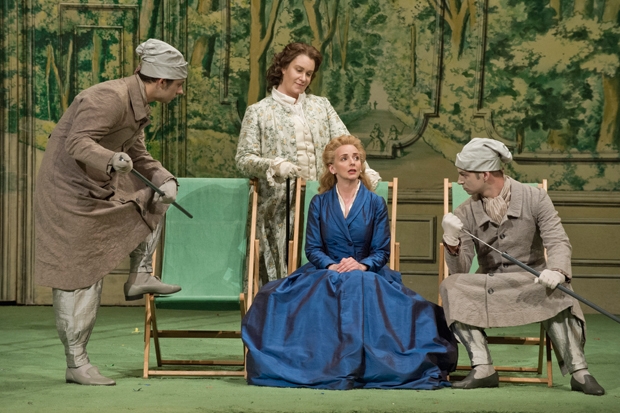One of the greatest tests of how an opera house is functioning is the quality of its revivals. Both the Royal Opera and the English National Opera score highly in that respect. You can go to the Met, to Munich, to the Vienna State Opera and see pathetically run-down performances, the cast thrown on to the stage and told to get on with it. That never happens at the two London houses.
The latest revival of Rigoletto at the Royal Opera is, in most ways, fresher than the first run in 2001. It’s the production with the split-second full-frontal male nude in the opening scene, now prolonged to two split seconds. Actually, the opening scene, revealing the Duke of Mantua’s court in all its libidinous squalor, is the least convincing part of the proceedings. Granted that the Mantuan courtiers may well be enjoying themselves less than they are pretending to, the performers themselves are a pretty unenthusiastic crew. Their simulated copulations and assorted gropings lack any of the brio we hear in the music. It’s only in the second scene, with the marvellous music for Sparafucile, that things get gripping, and they remain tense and absorbing for the rest of the evening. Nothing, really, can make the abduction of Gilda seem less than the most foolish episode in any opera, but by then Verdi’s inspiration is so vital that disbelief, already wobbling severely, is willingly abandoned.

Maurizio Benini is now a permanent fixture at the Royal Opera as director of Italian operas, and a welcome one. He’s the old-fashioned, Serafin-type conductor, concerned to support his singers, never spectacular but never disappointing. The evening I went, when the performance was being shown countrywide on screens, had some changes of cast from the earlier performances, but I suspect they were all for the better. I can’t imagine Simon Keenlyside, whom I have seen in the title role, ever being as persuasive as Dimitri Platanias, who may be the best Rigoletto I have ever seen. More bug-like than any of his predecessors in this production, he has a sumptuous but grainy true bass, and can modulate from ranting, shaking rage to abject pleading with peerless continuity. Eri Nakamura is likewise an ideal Gilda, her voice girlish but her acting showing that the Duke’s advances are a most welcome change from her convent-like existence. Saimir Pirgu was the unscheduled Duke, rather a burly one, but his singing had a carefree elegance. And Alexander Tsymbalyuk was an almost silky Sparafucile, a part one wishes Verdi had found more use for. The grubby sets and David McVicar’s production show no signs of ageing, and may well become one of Covent Garden’s permanent fixtures.
Handel’s Xerxes at ENO has already, in Nicholas Hytner’s production from 1985, achieved the status of a classic of the Handel opera revival. With its monumental aspects, its ashen extras and its green deckchairs, it cunningly manages to remain up to date without upsetting baroque expectations. I have seen it quite a few times, have always admired the performances, but have had a wide-ranging set of reactions to the work itself.

On this occasion, it bored me to the point of near-hysteria, as only baroque operas can. I know that it is, unusually for Handel, non-political, that there is plenty of sly satire in it, that the characters are up to a point differentiated in the music they are given, but I want something that demands more. It’s ideal for someone who wants to spend a very long evening looking at charming sets and costumes, hearing lovely and mainly rather brief arias, and perhaps awarding a chuckle every 45 minutes to a piece of smooth treachery on the part of one of the characters. Handel and his librettist had no illusions about human nature. But there is no interaction of a persuasive kind. The characters are solipsistic, regarding the others as objects of scorn or lust, but only very rarely allotting them a dignity and individuality that they claim for themselves.
Does anyone allege, however ardent a Handelian they may be, that they mind who gets off with whom at the end, in the way that we do mind, even in Rossini’s farces, let alone in Mozart’s comedies? You can’t mind, because the characters have never been endowed with the life that they instantly have in the case of those two other unillusioned masters of the portrayal of flightiness and the pains of passion.
This latest revival of Xerxes is well up to standard, with Alice Coote, now in her absolute prime, making more of the title role than one might think possible, and all the others approaching her standard. The conductor is Michael Hofstetter, who made so much of La traviata last year. He seems just as much at home with this score, and the proceedings were greeted with the warmth they deserve. I envy Handelians, with huge numbers of operas to explore, but find it hard to imagine what it must be like to be one.






Comments